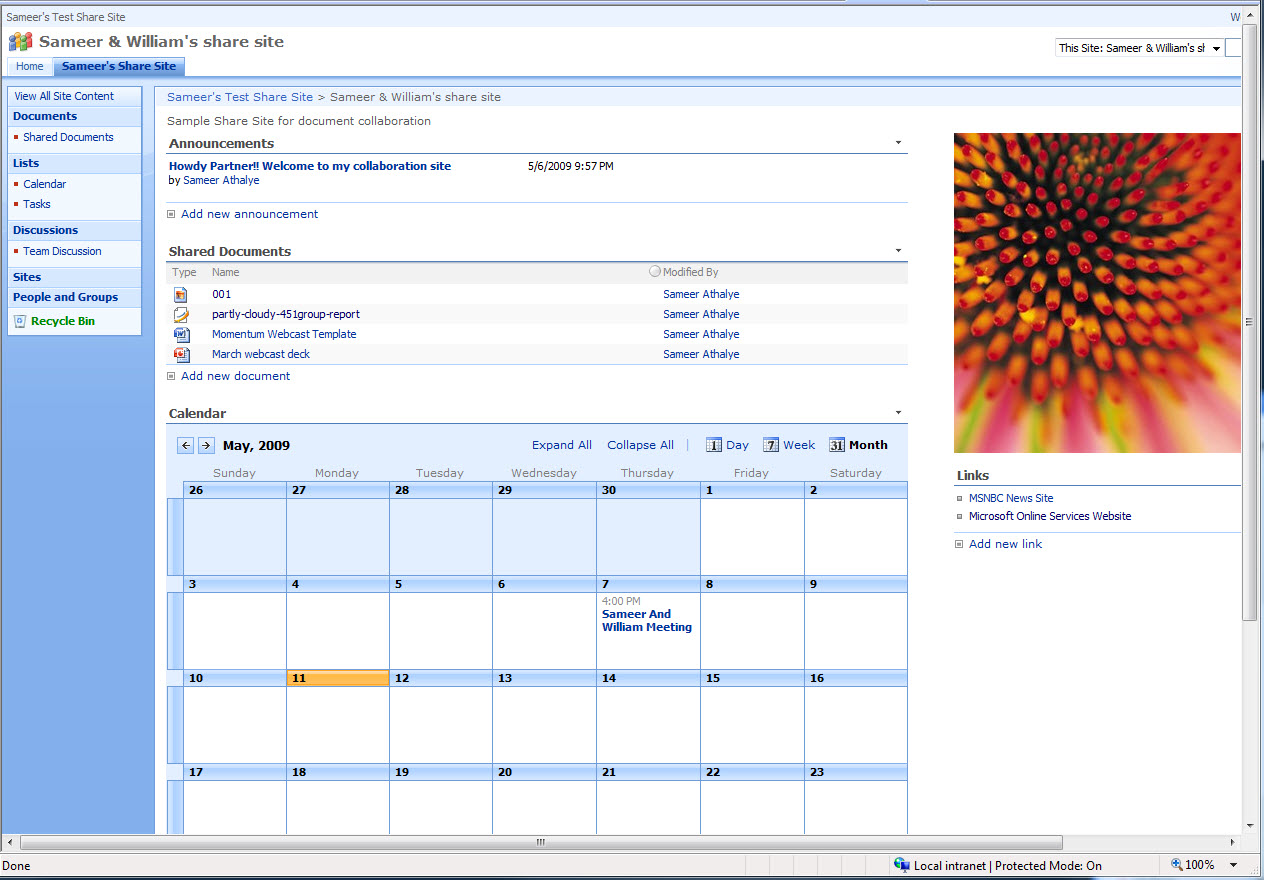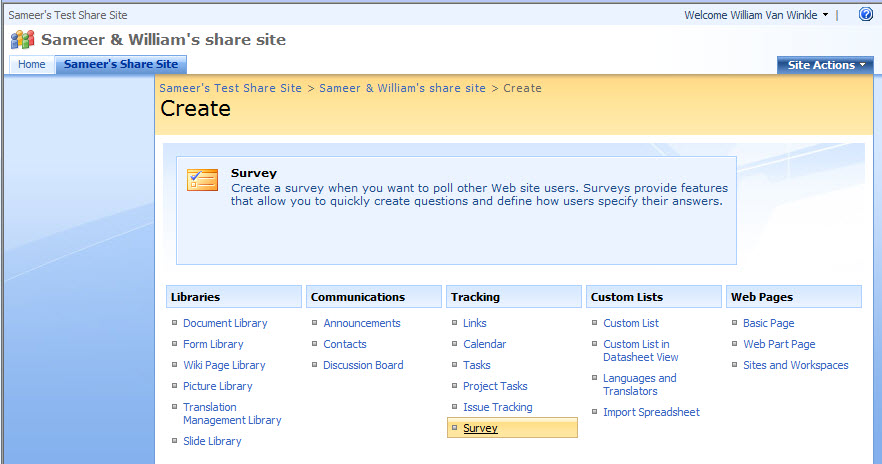Microsoft’s BPOS: Cloud Computing’s Silver Lining?
Four At The Core: SharePoint Online
Most users, even home-based consumers, have at least some acquaintance with Outlook. Not as many people have had occasion to work with SharePoint. Traditionally, this application was aimed more at businesses large enough to need a way for geographically disparate employees to collaborate on projects. However, the world has grown more mobile, and today’s five-person company may not even have a central location. Yet the need remains for everyone to stay on the same page when it comes to where documents and data should reside. Even school kids know the problem. “Which drive did I put that on? Is the version on my flash drive more current than the one on my C: drive?” Trouble gets compounded by the usual practice of attaching documents through email across multiple participants. It’s chaos.
By making the cloud the authoritative location for all files, though, such problems vanish. Users simply “check out” a document to work on it, then, check it back in when finished. There’s no more confusion over which version is current because only one user can have modification rights at any given time, and as many historical versions can be saved as needed.
What we’ve described here are document libraries, but that’s only one of the many things SharePoint Online tackles. On a broader scale, SharePoint is meant to help define, organize, and manage collaborative groups. Admins can create cloud-based group workspaces and grant individuals access to only the workspaces they belong in. These workspaces can take on a host of forms and functions, and SharePoint helps reduce the creation time of these spaces to only a few minutes thanks to a wide selection of templates.
Essentially, SharePoint gives you a slew of site building blocks with which to populate these workspaces. These could be file repositories, blogs, wikis, task lists, shared calendars, surveys, RSS feeds, or many other items. One of the coolest capabilities in the application is workflow management. This essentially breaks down a task into a series of steps and if/then operations, and at each point, users who own each step can indicate the status for that element. Visualizing how this could apply within a workgroup, such as in preparing a batch of press materials for a product launch, is fairly easy. But consider other applications. Some could be less serious, such as organizing the company picnic, while other applications could help improve operations even outside the company.
For example, consider a small firm, Company X, with several vendors. Company X’s accountant decides to use SharePoint Online to help organize the invoicing and payment processes. The accountant gives one of the company’s 10 or 20 BPOS licenses to the payables rep at one of the vendors. With this, the vendor can tap into Company X’s SharePoint workspace for accounting and check off the various tasks at hand, such as receiving an invoice, getting it approved for payment, and issuing a check. With the process visible via SharePoint, there’s no more need for time consuming phone calls or emails between the two parties, and both can cooperate more efficiently.
Get Tom's Hardware's best news and in-depth reviews, straight to your inbox.
Current page: Four At The Core: SharePoint Online
Prev Page Four At The Core: Exchange Online Next Page Four At The Core: Office Live Meeting-
cadder Web-based apps have very poor performance, even for something as simple and basic as email. Software on your own computer will always perform better and be more responsive, as well as have many more capabilities. Not to mention eliminate the continual problems almost all users have with internet access and remote server reliability. I will continue to purchase software to run on my own computer independent of web access.Reply -
wicko You know, when I first read the title, the first thing that came to my mind was "Microsoft's Big Piece of Shit". ME, is that you?Reply -
bob boblaw ReplyCan Microsoft’s Business Productivity Online Suite (BPOS) reignite our hope-strewn love affair with cloud computing?
Who is the "our" in this? I don't recall ever liking cloud computing. Or is that thoughtcrime? -
descendency cadderWeb-based apps have very poor performance, even for something as simple and basic as email.Poor application design. Actually, your own example is the worst you could have picked. ANY application you use for email could be easily written to use the same UI as a Silverlight application. While the software is not local to your machine, the computing will be. So, the only real loss will be at loading time for the application (which if done well will be minimal). The rest would be identical (as a matter of fact, if the code is written in a .NET language already, it could be nearly directly ported to Silverlight... so saying it would be identical would be dead on.). Just because the install isn't local doesn't mean the processing can't be.Reply
Gaming will require a major boost in internet speed before it can be offloaded successful (because sending huge amounts of textures, models, and other media just isn't possible across the average cable connection yet). The only applications that can't be ported are ones where massive data transmission is required constantly. However, applications like MS Word will be easy to port especially if the files are all stored local.
Let me give you an example of a RIA (rich internet application) you use without even realizing it... If you do any online shopping, you use a RIA. How many desktop applications do you own for shopping on the internet? Zero? Yea. That's because when a RIA is designed well enough, the "desktop applications are better" mentality is foolish. -
NeatOman The matter of fact is simple... Right now you don't own you OS or the Software on it, and it can (has been) change at any time without your consent. That is because like stated in the article, you do not own the software and as with any license it can be taken away. This is just the next step where they want to get you to give up you physical computer and only give you a terminal.Reply
The reality is that there really is very little if no benefit from "cloud" computing, and the only reason no one could figure out what the benefits were is because there are non for the user. -
lordfisch NeatOmanThe reality is that there really is very little if no benefit from "cloud" computing, and the only reason no one could figure out what the benefits were is because there are non for the user.Other than, you know, costing a small fraction of local versions. And never having to update. And never having to deal with a hijacked license. And not having artificial "install limits." And not carrying around countless boxes of install CDs. And not, and not, and not...Reply -
in order to support cloud for ALL applications and games,the internet needs to change and become at least 10 times, if not 100 times faster than it currently can.Reply
Also limitations of 15GB/month need to go. bandwidth limitations need to go in order to get cloud working.
I see only cloud computing working in lower performing apps,not in games or video. -
erichlund Performance and quality may be issues today, but cloud computing will mature over time. However as a user in a classified environment, and even for users in a sensitive business environment, there are times when you just don't want your information attached to the internet. That means dedicated apps. So, where the author cannot think on one reason, I certainly can.Reply

